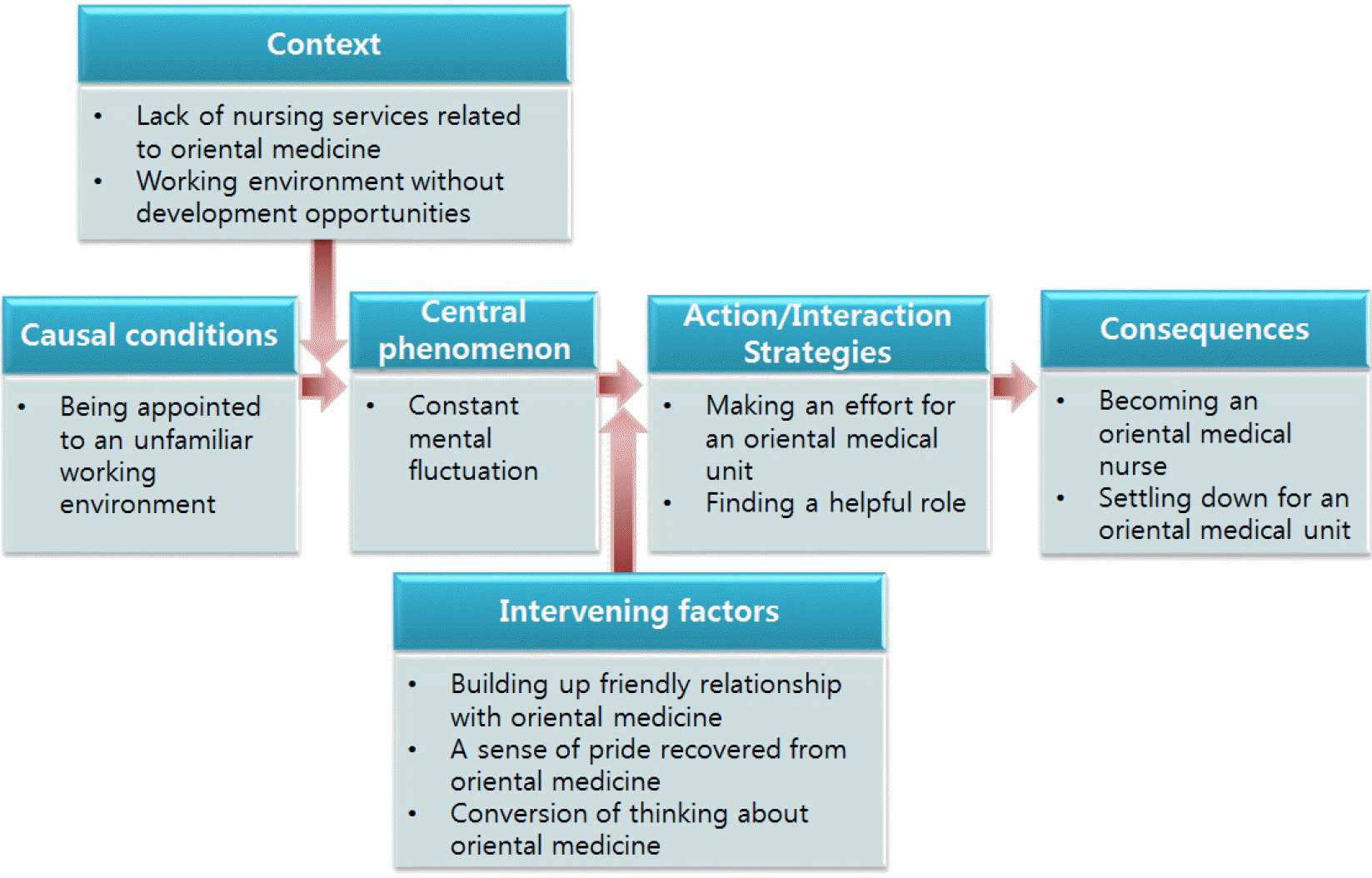Abstract
Purpose
The purpose of this study was to understand and describe the adjustment experiences of nurses to an oriental medical unit.
Methods
Fourteen nurses who worked or were working in oriental medical units participated. Data were collected through in-depth interviews from April to December, 2013. Analyses of the transcribed interviews were done using Corbin and Strauss's grounded theory.
Results
Through the constant comparative analy-sis method, the central phenomenon was identified as ‘ constant mental fluctuation’. Nurses reported their adjustment to an oriental medical unit through four stages. The stages were described as ‘ the discouraged’ stage, ‘ the conflicted’ stage, ‘ the restructuring’ stage and lastly ‘ the coexistence’ stage.
Conclusion
As the participants reported the process of adjusting, they reported continuous constant conflicts and struggles with the oriental medical doctors, the nursing department, patients and their guardians and lastly with themselves. The process of becoming integrated into an oriental medical unit is a complex study and should be studied further in terms of whether this process is the same or different adjusting to other units.
REFERENCES
1.Kim YH., Lee MK., Lee SJ., Cho MS., Hwang MS. Medication sta-tus and adherence of the elderly under home care nursing. Journal of Korean Academy of Community Health Nursing. 2011. 22(3):290–301. https://doi.org/10.12799/jkachn.2011.22.3.290.

2.Jung IT., Lee SH., Kim SY., Cha NH., Kim KS., Lee DI, et al. A clinical study of east-west pain treatment on chronic headache patients. The Acupuncture. 2005. 22(3):93–104.
3.Moon HJ., Kim KJ., Park SA., Kim IW. A study on oriental nursing intervention of necessity, knowledge and practice. Journal of East-West Nursing Research. 2003. 8(1):73–80.
4.Ok DH. A study on nurses' role in traditional Korean medicine & care [dissertation]. Seoul: Kyung Hee University;2000. p. 1–85.
5.Oriental Nursing Research. Oriental college of nursing. Seoul: Hyeonmunsa;1998.
6.Kim MJ., Kim MH., Jeong HS., Kim YS. Analysis of the job of nurses working on oriental medicine wards. Journal of Korean Academy of Nursing Administration. 2015. 21(4):341–53. https://doi.org/10.11111/jkana.2015.21.4.341.

7.Moon HJ., Shin HS., Yang KM. The study of curriculums on the nursing in oriental medicine. Journal of East-West Nursing Research. 2000. 5(1):114–9.
8.Yang KH., Lee AR., Jang HS. Work stress of nurses who work in oriental medical hospital. The Korean Central Journal of Me-dicine. 1992. 57(3):177–86.
9.Lee JS., Kim HK., Park GC. The effects of role conflicts and burn-out on turnover intention in nurses of oriental medicine hospitals. The Journal of the Korea Contents Association. 2015. 15(3):241–51. https://doi.org/10.5392/JKCA.2015.15.03.241.

10.Kim SS. The experiences in long-term care hospital as a nurse [dissertation]. Busan: Dong-A University;2014. p. 1–101. .S.
11.Park EJ., Kim YH. A grounded theory-based approach to practice adaptation process of hemodialysis unit nurses. Journal of Korean Academy of Nursing Administration. 2013. 19(1):128–37. https://doi.org/10.11111/jkana.2013.19.1.128.

12.Park HS., Kim KN., Kang EH., Lee JM., Park SM. Lived adaptation experiences of new ICU nurses who are working in a new-ly established university hospital. Journal of Korean Academy of Fundamentals of Nursing. 2011. 18(2):226–36.
13.Seo KS., Kim MY. Clinical work experience of Korean immi-grant nurses in U.S. hospitals. Journal of Korean Academy of Nursing. 2016. 46(2):238–48. https://doi.org/10.4040/jkan.2016.46.2.238.

14.Bragg SM., Bonner A. Degree of value alignment: a grounded theory of rural nurse resignations. Rural and Remote Health. 2014. 14(2):2648–58.
15.Jamieson LN., Williams LM., Lauder W., Dwyer T. The 'realities' of part time nursing: a grounded theory study. Journal of Nursing Management. 2008. 16(7):883–92. https://doi.org/10.1111/j.1365-2934.2007.00836.x.
16.Deegan J., Simkin K. Expert to novice: experiences of professional adaptation reported by non-english speaking nurses in Australia. Australian Journal of Advanced Nursing. 2010. 27(3):31–7.
17.Corbin J., Strauss A. Basics of qualitative research. 3rd ed.Los Angeles, CA: Sage Publications;2008.
18.Lincoln YS., Guba EG. Naturalistic inquiry. Newbury Park, CA: Sage Publications;1985. p. 1–416.
19.Chang KH., Lee EM. A study on the attitude on the transfer of duty post and job satisfaction of nurses. Journal of East-West Nursing Research. 2005. 11(1):12–24.
20.Kim YM., Chun IS., Park YM. Development of a hemodialysis nurse educational program and its effects. Journal of the Korea Academia-Industrial Cooperation Society. 2012. 13(12):5839–48. https://doi.org/10.5762/KAIS.2012.13.12.5839.

21.Meyer E., Lees A., Humphris D., Connell NAD. Opportunities and barriers to successful learning transfer: impact of critical care skills training. Journal of Advanced Nursing. 2007. 60(3):308–16. https://doi.org/10.1111/j.1365-2648.2007.04422.x.

22.Lee EY., Kim NH. Relationship among nurses' attitude on job rotation, job stress and organizational commitment. Korean Journal of Occupational Health Nursing. 2012. 21(2):154–63. https://doi.org/10.5807/kjohn.2012.21.2.154.

23.Ko IA., Kang YH. Role conflict of married nurses' influence on their job satisfaction -focused on the general hospitals Jeju re-gion-. Law & Policy Review. 2007. 13(2):1–27.
24.Song MR., Lee JS. A study on role conflict and job satisfaction in nurses in oriental medicine hospitals. Journal of Korean Academy of Fundamentals of Nursing. 2003. 10(3):316–25.
25.Son HM., Koh MH., Kim CM., Moon JH., Yi MS. The male nurses' experiences of adaptation in clinical setting. Journal of Korean Academy of Nursing. 2003. 33(1):17–25. https://doi.org/10.4040/jkan.2003.33.1.17.

26.Kim HJ., Yoo SK. Adjustment process of Korean adolescents studying abroad in the U.S. Korea Journal of Counseling. 2008. 9(2):615–44.
27.Kim HR., Kwon IS. A phenomenological study on oncology adaptation experiences of new nurses. Asian Oncology Nursing. 2014. 14(2):127–38. https://doi.org/10.5388/aon.2014.14.2.127.

28.Kim JH., Park KO., Kim JK., Yun HJ., Lee JH., Cho EK, et al. An adaptation experience of male nurses at general nursing unit. Journal of Korean Academy of Nursing Administration. 2016. 22(5):496–506. https://doi.org/10.11111/jkana.2016.22.5.496.

29.Lee JH., Lee BS. Role adaptation process of elementary school health teachers: establishing their own positions. Journal of Korean Academy of Nursing. 2014. 44(3):305–16. https://doi.org/10.4040/jkan.2014.44.3.305.

30.Park JP. A study on the beginning teachers' experiences in elementary schools. The Korean Educational Review. 2009. 15(3):131–57.




 PDF
PDF ePub
ePub Citation
Citation Print
Print




 XML Download
XML Download